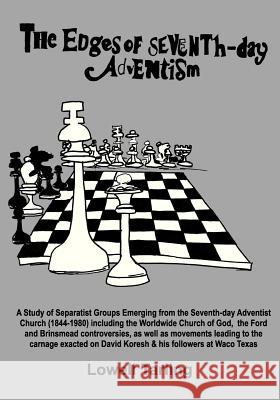The Edges of Seventh-Day Adventism: A Study of Separatist Groups Emerging from the Seventh-Day Adventist Church (1844-1980) Including the Worldwide Ch » książka
The Edges of Seventh-Day Adventism: A Study of Separatist Groups Emerging from the Seventh-Day Adventist Church (1844-1980) Including the Worldwide Ch
ISBN-13: 9781481170536 / Angielski / Miękka / 2013 / 236 str.
The Edges of Seventh-Day Adventism: A Study of Separatist Groups Emerging from the Seventh-Day Adventist Church (1844-1980) Including the Worldwide Ch
ISBN-13: 9781481170536 / Angielski / Miękka / 2013 / 236 str.
(netto: 56,98 VAT: 5%)
Najniższa cena z 30 dni: 59,00
ok. 16-18 dni roboczych.
Darmowa dostawa!
Lowell Tarling wrote 'Edges' for that most wonderful of all author incentives - insatiable curiosity. Combined with a quest for enlightenment, he undertook a subject few would have chosen-the history of those people and groups that separated from the Seventh-day Adventist church. Of necessity, this also includes touching on the history of the mainstream Seventh-day Adventist church. Lowell's education and early adult experiences were deeply entwined with the Seventh-day Adventist church. However, it would be a mistake to assume that his writing on the subject suffers from any degree of bias. There is a sense that he took on the role of bystander, and this essentially gave him a valuable degree of separation and objectivity. Methodical in his approach and relentless with regard to research, Lowell delivers a surprising, connective, inside view of a divisive period in the growth and emergence of the separatist groups that were spawned within the Seventh-day Adventist Church. Sparing nothing, he pares back the layers of doctrine, dogma and the heated nature of the schisms in the church. He deftly reveals the angst, divergence and egotism; but also humanity, desire for truth and humility. For all of these were present in the interchanges that shaped not only those movements that separated, but also the Seventh-day Adventist church. The first edition of 'Edges' was published in 1981. Reprinted now to a generation who did not share the past struggles is indeed worthwhile. It is because of the conflict and debate of those times that they now sit in the pews of churches of their choice, where 'saved by grace alone' is integral and unchallenged. Essentially, emergence from dissension is a human experience. It occurs with every doctrine, creed or organisation. There is a wider view - this is not only the history and narrative of one church's crises. It touches wherever we are in life. Ultimately, it is impossible to ignore the authenticity of Lowell's search. We sense that it means more than a disengaged treatise on a topic of interest. In the end it matters less whether he found viable answers to a religious dilemma. It is significant that he had the courage to ask questions. Above all, it is notable that at the close of the book he chose the words spoken by Christ, 'Whosoever will, may come'.
Zawartość książki może nie spełniać oczekiwań – reklamacje nie obejmują treści, która mogła nie być redakcyjnie ani merytorycznie opracowana.











